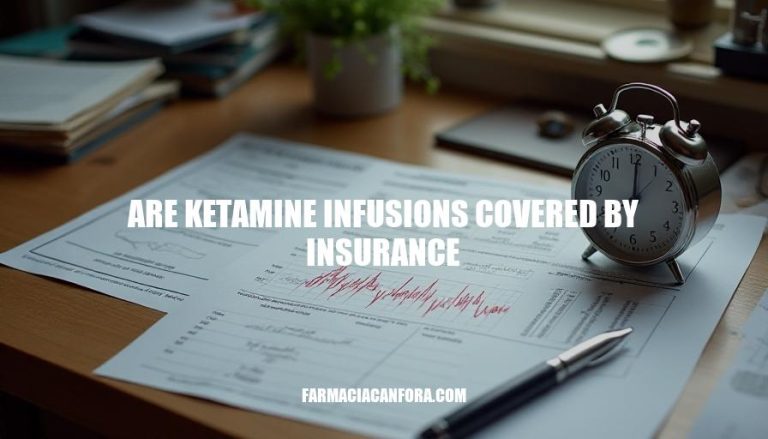


Ketamine infusions are gaining attention as a promising treatment for mental health conditions like depression and anxiety. However, understanding whether these treatments are covered by insurance is crucial due to their high costs, which can range from $300 to $800 per session. Insurance coverage varies, often depending on the specific diagnosis and the insurer’s policies. This financial aspect is significant for patients seeking these innovative therapies.
Ketamine infusions involve administering ketamine intravenously, typically in a clinical setting. Originally used as an anesthetic, ketamine has shown promise in treating mental health conditions like depression, anxiety, and PTSD, especially when other treatments have failed.
Medical Uses:
Insurance Coverage:
Insurance coverage for ketamine infusions is inconsistent. While some insurance plans may cover it, many do not because its use for mental health is considered “off-label”. However, the FDA-approved esketamine (Spravato) for treatment-resistant depression is more likely to be covered. Checking with your insurance provider beforehand is crucial to understand your coverage options.
Insurance coverage for medical treatments can be complex, especially for newer or less conventional therapies like ketamine infusions. Generally, insurance providers are more likely to cover treatments that are FDA-approved and widely recognized within the medical community. However, ketamine infusions, often used for treatment-resistant depression and chronic pain, present unique challenges.
Challenges and Considerations:
Navigating insurance for ketamine infusions requires thorough communication with your provider and understanding the specifics of your plan. Some clinics offer financial guidance and payment plans to help manage costs.
Here are the key factors that affect whether ketamine infusions are covered by insurance:
Specific Diagnosis: Coverage often depends on the condition being treated. Some insurance plans may cover ketamine infusions for certain mental health conditions like treatment-resistant depression, anxiety, or PTSD, but not for others.
Insurance Provider’s Policies: Each insurance provider has its own policies regarding coverage. Some may have specific criteria that must be met, such as documentation of previous treatments and their outcomes.
Off-Label Treatment: Ketamine is often used off-label for mental health conditions, meaning it is not FDA-approved for these uses. This can limit insurance coverage, as many insurers are hesitant to cover treatments that are not FDA-approved for the specific condition.
Medical Necessity and Documentation: Detailed documentation from healthcare providers, including the medical necessity of the treatment and previous treatment attempts, can influence coverage decisions.
FDA Approval Status: The lack of FDA approval for ketamine infusions for certain conditions can be a significant barrier to insurance coverage.
Clinical Evidence and Cost-Effectiveness: Insurance companies may consider the available clinical evidence supporting the effectiveness of ketamine infusions and compare the cost-effectiveness to traditional treatments.
These factors collectively determine whether ketamine infusions will be covered by insurance. It’s essential to consult with your insurance provider and healthcare professional to understand the specific requirements and possibilities for coverage.
Here are the steps:
Research Your Insurance Policy:
Contact Your Insurance Provider:
Gather Medical Documentation:
Consult with Your Doctor:
Submit a Pre-Authorization Request:
Follow Up:
Consider Appeals:
Taking these steps can help you navigate the process of getting ketamine infusions covered by your insurance. Good luck!
Here are some strategies for advocating for insurance coverage of ketamine infusions and appealing denied claims:
By following these strategies and working closely with your healthcare providers, you can improve your chances of getting insurance coverage for ketamine infusions.
Ketamine infusions are a treatment option for various conditions, but insurance coverage can be complex. Understanding your policy and advocating for coverage is crucial.
Research your insurance policy, gather medical records, consult with healthcare providers, and submit pre-authorization requests to increase the chances of approval.
If denied, appeal the decision by writing a detailed letter addressing the denial reasons and including supporting evidence.
Working closely with healthcare providers can help strengthen your case and ensure ongoing support.
Patients should proactively seek information and advocate for their needs to navigate the process effectively.